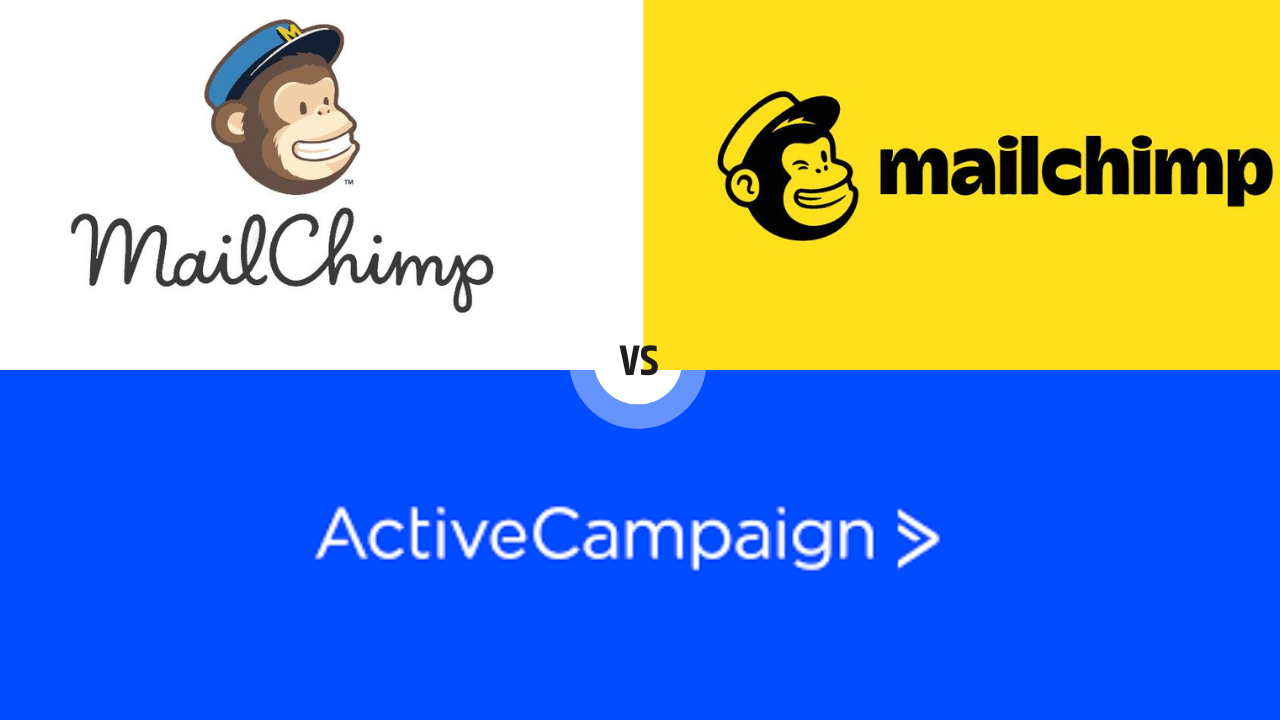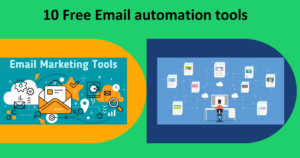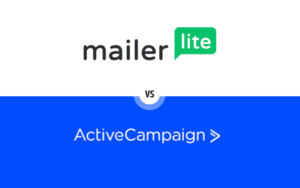In this comprehensive review, we’ll kickstart the exploration of two email marketing industry giants: ActiveCampaign vs Mailchimp. We’ll thoroughly dissect their features, pricing structures, automation capabilities, email templates, reporting tools, integrations, and customer support. By the end of this read, you’ll have a crystal-clear understanding of how ActiveCampaign vs Mailchimp compare and which one is best suited to elevate your email marketing strategy. Let’s dive into the world of ActiveCampaign vs Mailchimp to uncover the insights you need for a more effective email marketing approach.
Table of Contents
Features and Ease of Use: ActiveCampaign vs Mailchimp
2.1. ActiveCampaign Features
ActiveCampaign is renowned for its robust set of features. It offers advanced marketing automation, including behavior-based triggers, lead scoring, and split testing. It excels in creating personalized customer journeys.
2.2. Mailchimp Features
Mailchimp is user-friendly and suits beginners. It offers features for email campaigns, landing pages, and basic automation. While not as advanced as ActiveCampaign, it’s a solid choice for small businesses.
ActiveCampaign Features Image
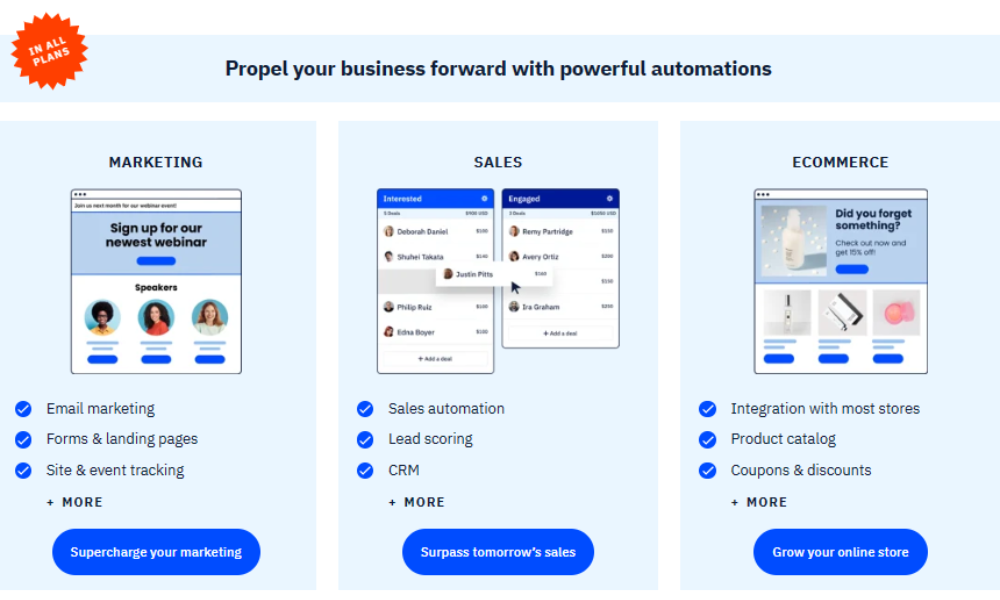
Mailchimp Features Image
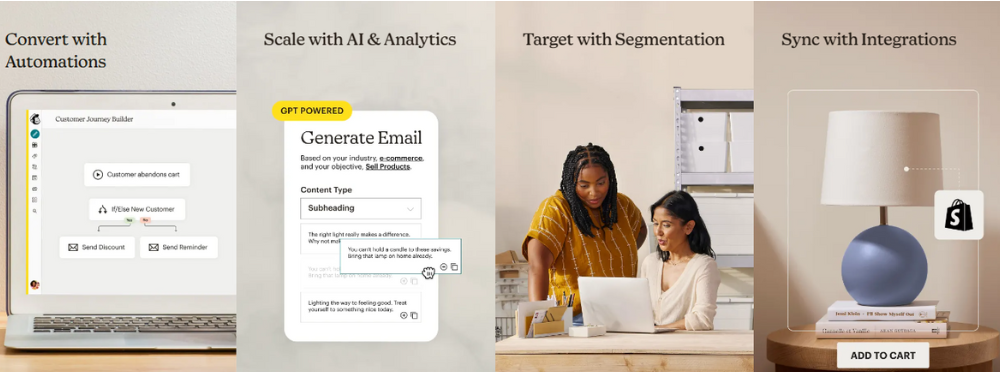
3. Pricing
3.1. ActiveCampaign Pricing
When it comes to pricing, ActiveCampaign employs a flexible model that caters to businesses of all sizes. The pricing structure revolves around the number of contacts you have and the features you require. Here’s a closer look:
- 14-Day Free Trial: ActiveCampaign offers a generous 14-day free trial, allowing you to explore the platform and its capabilities before committing to a paid plan.
- Starting at $9/month: The entry-level paid plan begins at just $9 per month. This plan covers the essentials for smaller businesses and includes features like email marketing, marketing automation, and a CRM.
- Scalable Pricing: As your contact list grows, ActiveCampaign’s pricing scales accordingly. This means you won’t be locked into a fixed price and can adjust your costs as your business expands.
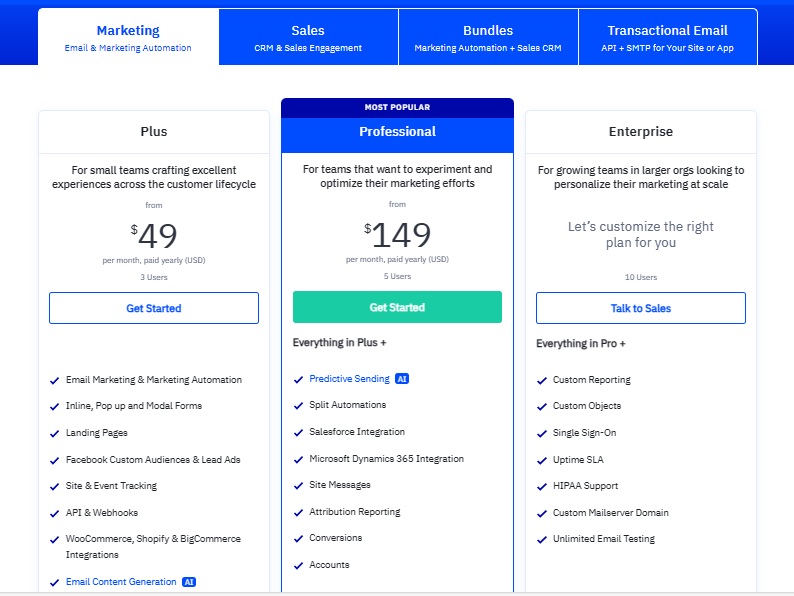
3.2. Mailchimp Pricing
Mailchimp, too, offers a pricing structure designed to accommodate businesses at various stages of growth. Here’s what you need to know:
- Free Plan for Up to 2,000 Contacts: Mailchimp provides a free plan that supports up to 2,000 contacts. This is an excellent option for smaller businesses or those just starting with email marketing.
- Starting at $9.99/month: If you require more advanced features and want to send beyond the free plan’s limitations, Mailchimp’s paid plans begin at $9.99 per month.
- Variable Pricing: Similar to ActiveCampaign, Mailchimp’s pricing varies depending on the number of contacts you have and the features you want to access. This means you have the flexibility to choose a plan that aligns with your specific needs and budget.
Both ActiveCampaign and Mailchimp offer accessible pricing structures, making them suitable for businesses with different requirements. Consider the size of your contact list and the features you need when evaluating which platform’s pricing model best suits your email marketing strategy.
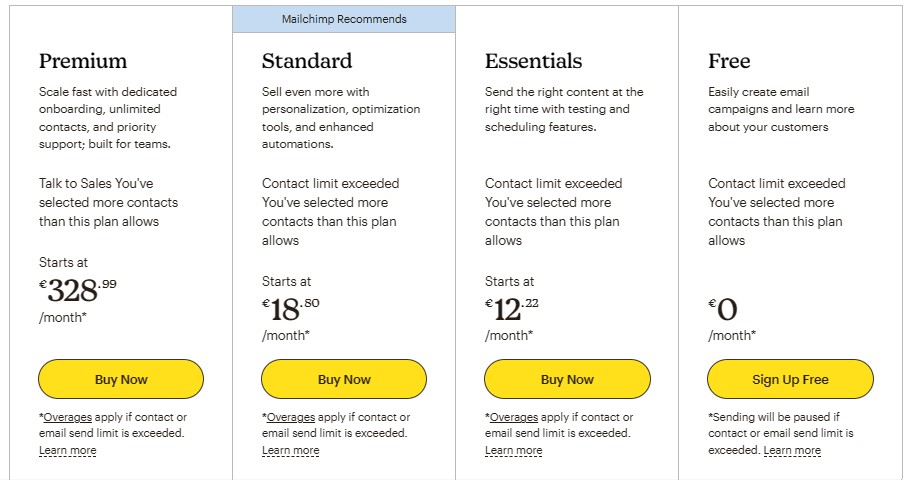
Automation and Segmentation
4.1. ActiveCampaign Automation
ActiveCampaign is renowned for its robust automation features, making it a top choice for businesses with multifaceted marketing needs. Here’s why:
- Complex Workflows: ActiveCampaign empowers users to design intricate automation workflows with ease. Whether it’s a series of follow-up emails, lead nurturing, or customer onboarding, you can create highly detailed sequences tailored to your specific objectives.
- Segmentation: This platform excels in segmenting your audience. You can divide your contact list into numerous categories based on behaviors, demographics, or engagement levels. This precision allows for hyper-targeted communication, enhancing your chances of conversions.
- Conditional Content Delivery: ActiveCampaign offers the ability to personalize content based on individual subscriber data. You can dynamically adjust email content to suit a recipient’s preferences or previous interactions, resulting in more engaging and relevant messages.
- Integration: ActiveCampaign integrates seamlessly with various other tools and platforms, providing a holistic approach to marketing automation. This means you can connect your CRM, e-commerce, and other software to create a unified marketing ecosystem.
- Scalability: As your business grows, ActiveCampaign can accommodate your evolving needs. Its scalability ensures that your automation efforts remain effective, even as your customer base expands.
4.2. Mailchimp Automation
Mailchimp, on the other hand, offers automation that is more straightforward but still effective, making it suitable for businesses requiring basic email sequences and segmentation. Here’s an overview:
- Simplicity: Mailchimp’s automation is user-friendly and intuitive, making it accessible to marketers with varying levels of expertise. Setting up basic email campaigns and automations is a breeze.
- Email Sequences: You can easily create automated email sequences for things like welcome emails, product recommendations, or follow-up messages. This is ideal for businesses with simpler marketing needs.
- Segmentation: While Mailchimp supports segmentation, it may have limitations when compared to ActiveCampaign. It allows you to divide your audience based on criteria like location and purchase history, but it may not offer the same level of granularity.
- Limitations: For businesses with highly intricate automation requirements, Mailchimp may have some limitations. Complex workflows might be challenging to execute compared to ActiveCampaign’s more robust capabilities.
In summary, ActiveCampaign stands out for its advanced automation capabilities, catering to businesses with diverse and intricate marketing needs. In contrast, Mailchimp offers a simpler but effective automation solution, suitable for businesses that primarily require basic email sequences and segmentation. The choice ActiveCampaign vs. Mailchimp depends on the complexity of your marketing strategies and your specific business requirements.
Email Templates and Design
5.1. ActiveCampaign Email Templates
ActiveCampaign provides a range of email templates, but they might not be as visually appealing as Mailchimp’s. Customization options are extensive for those with design skills.
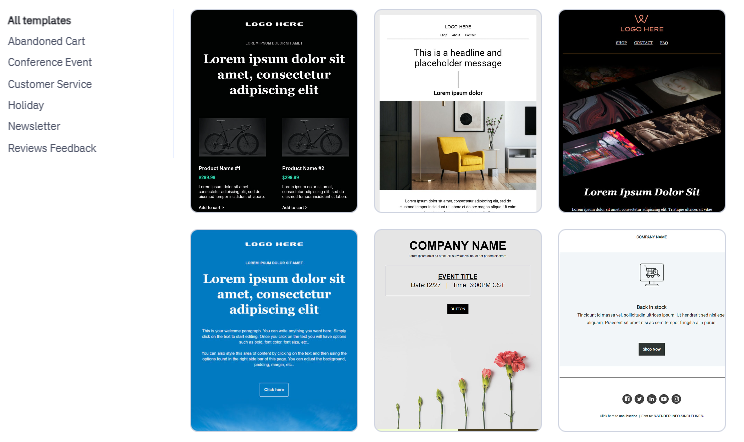
5.2. Mailchimp Email Templates
Mailchimp boasts visually appealing templates with a user-friendly drag-and-drop builder. It’s an excellent choice for businesses wanting stunning emails without design expertise.

Reporting and Analytics
6.1. ActiveCampaign Analytics
ActiveCampaign offers detailed analytics with real-time tracking, including open rates, click-through rates, and conversion tracking. It also integrates with Google Analytics.
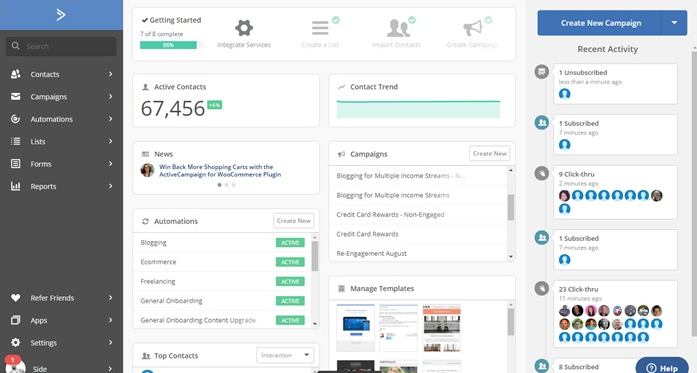
6.2. Mailchimp Analytics
Mailchimp provides comprehensive reports with insights on subscriber behaviour. It offers A/B testing and e-commerce tracking, making it suitable for online stores.
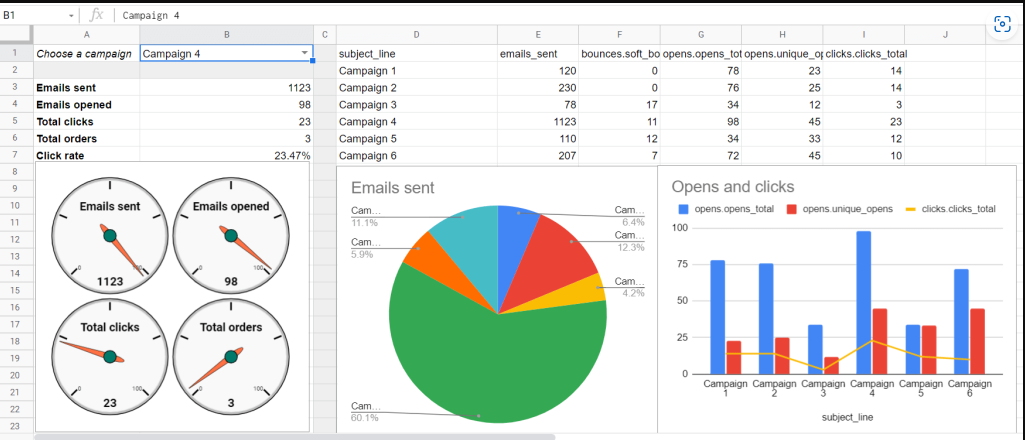
Integrations
7.1. ActiveCampaign Integrations
ActiveCampaign’s integration capabilities are a pivotal aspect of its appeal, allowing businesses to create a well-rounded and interconnected marketing ecosystem. Here’s an in-depth exploration of its integration strengths:
ActiveCampaign integrates with 920+ different apps so you can connect with the tools that you love and already use.
- CRM Integration: ActiveCampaign stands out for its seamless integration with Customer Relationship Management (CRM) systems, including industry giants like Salesforce. This integration empowers businesses to centralize their customer data, synchronize communication history, and automate marketing processes. With CRM integration, you can nurture leads, manage customer relationships, and drive sales with unprecedented efficiency.
- E-commerce Platforms: For online retailers, ActiveCampaign offers robust integration with e-commerce platforms such as Shopify. This connection is a game-changer, enabling businesses to automate personalized email marketing campaigns, segment customers based on their purchase history and behavior, and trigger targeted promotions. It’s a powerful tool for enhancing customer engagement and driving revenue in the e-commerce sector.
- Versatility: Beyond CRM and e-commerce, ActiveCampaign demonstrates its versatility by seamlessly connecting with a wide spectrum of other tools. These include Content Management Systems (CMS), analytics platforms, social media management tools, and more. This adaptability empowers businesses to assemble a tailored marketing technology stack that perfectly aligns with their unique needs and strategic objectives.
- API Access: ActiveCampaign goes further by providing API access, a boon for businesses with specific or custom requirements. This allows for the creation of bespoke integrations, bridging the platform with proprietary or specialized software, ensuring that ActiveCampaign remains a flexible and future-proof solution.
7.2. Mailchimp Integrations
Mailchimp, too, boasts a robust collection of integrations that cater to diverse facets of the marketing landscape. Let’s explore the depths of its integration prowess:
- E-commerce Platforms: Mailchimp’s deep integration with e-commerce platforms, including WooCommerce, is a boon for online businesses. This seamless connection empowers marketers to automate email campaigns tailored to online shopping behavior, track customer interactions, and deliver highly targeted product recommendations, thereby boosting sales and enhancing the overall e-commerce customer experience.
- Marketing Tools: Mailchimp extends its integration capabilities to popular marketing tools like Zapier. This opens up a world of possibilities, as Zapier facilitates the integration of Mailchimp with a vast array of third-party applications. This versatility allows marketers to extend automation beyond Mailchimp’s native features, streamlining workflows and enhancing productivity.
- Social Media Integration: Recognizing the importance of social media in modern marketing, Mailchimp offers integrations with various social media platforms. This synergy enables marketers to synchronize email marketing efforts with their social media strategies, ensuring a consistent and cohesive brand presence across multiple channels.
- Analytics Integration: Mailchimp doesn’t stop at campaign creation; it also connects with analytics tools. This integration equips marketers with valuable insights into the performance of their email campaigns, enabling data-driven decision-making and the continuous refinement of marketing strategies.
In comparison of ActiveCampaign vs. Mailchimp, both of them excel in the realm of integrations, but their focuses and strengths differ. ActiveCampaign’s prowess lies in CRM integration, making it an excellent choice for businesses heavily invested in customer relationship management. It also offers versatility by connecting with a broad spectrum of tools. On the other hand, Mailchimp shines in e-commerce integration and its compatibility with marketing tools, making it an ideal solution for businesses seeking to streamline their e-commerce marketing efforts. Ultimately, the choice between the two hinges on your unique business needs and the composition of your marketing technology stack.
Customer Support
8.1. ActiveCampaign Support
ActiveCampaign offers email and chat support on all plans. Phone support is available on higher-tier plans. Their knowledge base is extensive and helpful.
8.2. Mailchimp Support
Mailchimp provides email and chat support on all plans. Phone support is available on select plans. They have a knowledge base and a community forum for self-help.
Conclusion: ActiveCampaign vs. Mailchimp
Choosing between ActiveCampaign and Mailchimp depends on your specific needs. ActiveCampaign excels in automation and complex workflows, making it a robust choice for businesses with diverse marketing requirements. In contrast, Mailchimp’s user-friendly interface and visually appealing templates make it a great option for small businesses and those looking for simplicity.
Consider your budget, the scale of your email marketing, and your technical expertise when making a decision. Both platforms have their merits, so evaluate which one aligns best with your goals and resources to supercharge your email marketing efforts.


